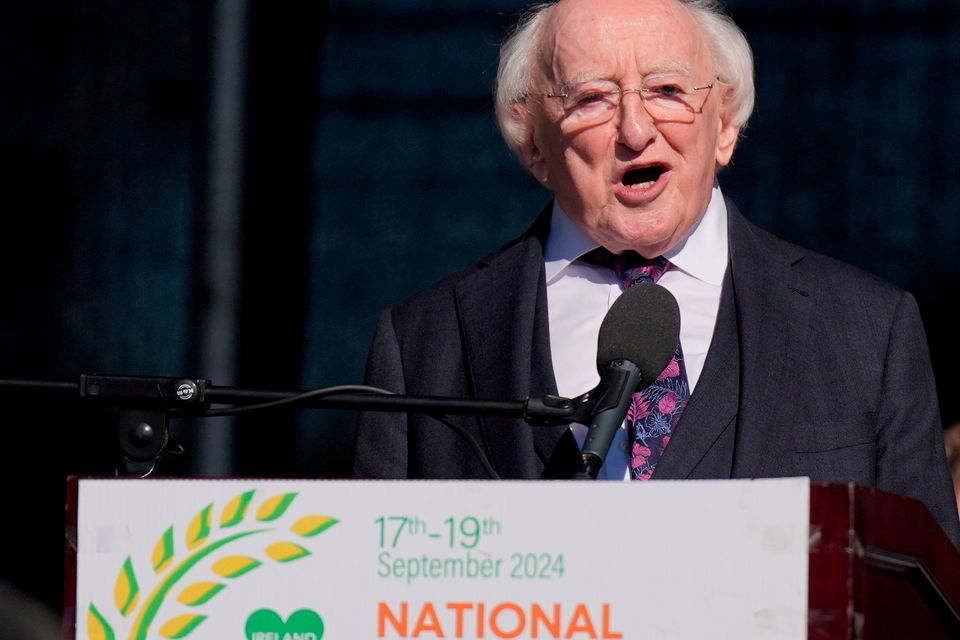
President Michael D Higgins speaks during the opening ceremony at the National Ploughing Championships at Ratheniska, Co Laois. Photo: PA Bravo, Michael D Higgins. Using the high-profile platform of the Ploughing Championships, he stated that powerful world leaders were complicit in the avoidable loss of lives in Gaza.
I would add that some of those world leaders are also complicit in war crimes. A strange stillness has settled over Government Buildings since Ireland recognised Palestine. It was as if we had done our bit, but now rested on the oars.

The butchery continues. Thank God for President Higgins and his moral compass that reflects decent Ireland. While we bask in glorious Ploughing Championships weather, Gaza is ploughed with the blood of its children and women.
John Cuffe, Meath The recent decision by Dún Laoghaire-Rathdown County Council to hold an in-camera meeting regarding its defence of the controversial de-zoning of land previously designated for housing illustrates starkly the systemic failures of local governance. In the midst of a housing and affordability crisis that threatens to harm future generations, the actions of those councillors is deeply troubling. Such conduct raises questions.
All planning and zoning decisions should be centralised at the national level to ensure a cohesive and fair approach to development, rather than allowing local biases to dictate outcomes. The mere dislike of a proposed development in a specific area should never serve as a legitimate basis for refusal. We must advocate for policies that prioritise the welfare of citizens and the pressing need for sustainable housing solutions.
Thomas O’Connor, Crumlin, Dublin 12 We have to welcome the Dáil’s return after its summer recess. It can now formally reflect the empathy of its electorate with the continuing slaughter and suffering in the Middle East. Hopeful indicators have arisen that Ireland can at last offer its major contribution to delivering peace in the region.
Only a week into its recess, there were calls for the Dáil’s return. On July 19, the International Court of Justice (ICJ) had ruled that Israeli settlements in Palestine were in breach of international law. The Occupied Territories Bill gained majority support in the Seanad and Dáil, along with the electoral endorsement of parties committed to it.
However, since then, it has failed to be enacted by the Government on the grounds it is not compatible with our EU membership. Recently, Professors Takis Tridimas and Panos Koutrakos, experts on EU trade law, said the Occupied Territories Bill was indeed compatible with EU law. Another consequence of the ICJ rulings was Tánaiste Micheál Martin’s announcement that Ireland would stop buy military equipment from Israel.
Next, our Occupied Territories Bill, with its core aim of peace through dialogue, needs to be enacted. David Clinch, Dún Laoghaire, Co Dublin The Modernisation and Renewal Programme 2016-2021 in An Garda Síochána acknowledged that emphasis was needed on the psychological well-being of its staff. It found that “members of An Garda Síochána had concerns over exposure to trauma, increased administration, a lack of support, poor communication from management, unsocial hours, nepotism in the promotion process and a lack of resources and training”.
Research was carried out by Paul Gavin and Cody Normitta Porter between September and December 2023, and they published an article last June about the mental health of police officers in the Republic of Ireland. That research looked at, from an organisational perspective, “stressors including shift work, long hours, a lack of support from senior managers, excessive workloads and increased administration” and how these affected officers’ mental health and well-being. Those garda members surveyed, both male and female, “listed various experiences associated with traumatic exposure”.
These included “witnessing murders, being physically assaulted, being assaulted at gunpoint, being shot, attending scenes of suicide and the murder of a colleague”, rape and sexual assault investigations and family death notifications. Some officers also complained of bullying by senior officers, while others complained of “unrealistic and unreasonable public expectations, as well as excessive public scrutiny, especially through public recording of police actions on camera phones”. No one, other than those of us, serving or retired, understands the full impact that all of the above have on our mental health and well-being and the effect that has not only on your job but also on your family and friends So those of you who sit in judgment of An Garda Síochána, and most especially its frontline officers, take a brief moment to look at those men and women in uniform and ask yourselves what it would be like to walk in their shoes for one day.
Christy Galligan, Letterkenny, Co Donegal The cheek of the Government to beg the UK to contribute a few million pounds towards the reconstruction of Casement Park in Belfast while it refused to collect €14bn from Apple. Peter Kennedy, Sutton, Dublin 13 I really enjoyed Ian O’ Doherty’s turf piece, ‘Turf fire in a pub won’t destroy the planet, so save your guilt-tripping for the big boys’ ( Irish Independent , September 18). Seriously, well done to Ian and the Houghs, owners of JJ Houghs pub in Banagher, Co Offaly, for reminding us there’s nothing like a turf fire in a quintessential Irish pub of a winter’s evening to help the creamy pint taste better, notwithstanding the tut-tuts of over-sensitive carbon footprint warriors who can’t see the wood for the trees.
Aidan Roddy, Cabinteely, Dublin 18 Join the Irish Independent WhatsApp channel Stay up to date with all the latest news.














